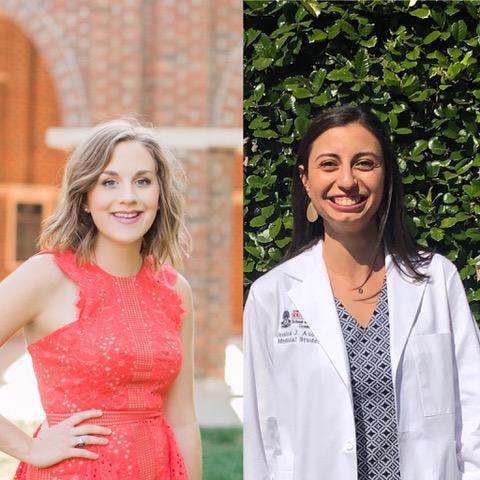
Get the latest articles delivered directly to your inbox!
Our Contributors
Class of 2022
Kyle Duke
Austin Foster
Charlotte Leblang
Ross Lordo
Class of 2021
Dory Askins
Connor Brunson
Keiko Cooley
Mason Jackson
Class of 2020
Megan Angermayer
Carrie Bailes
Leanne Brechtel
Hope Conrad
Alexis del Vecchio
Brantley Dick
Scott Farley
Irina Geiculescu
Alex Hartman
Zegilor Laney
Julia Moss
Josh Schammel
Raychel Simpson
Teodora Stoikov
Anna Tarasidis
Class of 2019
Michael Alexander
Caitlin Li
Ben Snyder
Class of 2018
Alyssa Adkins
Tee Griscom
Stephen Hudson
Eleasa Hulon
Hannah Kline
Andrew Lee
Noah Smith
Crystal Sosa
Jeremiah White
Jessica Williams
Class of 2017
Carly Atwood
Laura Cook
Ben DeMarco
Rachel Nelson
Megan Epperson
Rachel Heidt
Tori Seigler
Class of 2016
Shea Ray
Matt Eisenstat
Eric Fulmer
Geevan George
Maglin Halsey
Jennifer Reinovsky
Kyle Townsend
Join USCSOMG students on their journeys to becoming exceptional physician leaders.

Advocating for Community Health
During my Internal Medicine rotation, I cared for a Latinx patient with end stage renal disease. He had made all the recommended lifestyle changes and was taking his medication as prescribed, but was at the point in his disease progression where he most likely needed a kidney transplant. When I asked about his ongoing medical treatment, he became tearful, confiding that he was unable to get dialysis three times a week. Due to his undocumented status, he was only eligible to receive dialysis emergently when he became very ill. This health inequity broke my heart, and I decided I wanted to work on a project that would help the Latinx community in South Carolina. Jessica Accardi (M2), my partner in this project, had experiences at the Greenville Free Medical Clinic, EMT shifts, and examining health disparities through her Masters in Community Engaged Medicine, that lead her to this research project with PASOs Greenville.
PASOs is an organization that focuses on supporting Latinx communities in South Carolina with “education, advocacy and leadership development.” Jessica and I embarked on a quality improvement project with Dr. Linton (Medical Director of PASOs Greenville) and Rut Rivera (Manager of PASOs Greenville). The purpose of this project was to identify areas for improvement and conduct a needs assessment among PASOs Greenville community health workers (CHW), known as Promotoras (health promoters). This information would then be used to enact change to enable the Promotoras to be better equipped to engage with PASOs, and thus better serve the Latino community.
The role of a CHW is to provide basic health and medical care within a certain locale. CHWs are trusted members of their communities who understand the needs and dynamics of the populace they are serving. CHWs can help community members overcome cultural and linguistic barriers that may impede navigation of the healthcare system. As we conducted our research, we found that CHWs play a large role in global healthcare systems, yet this concept has not been fully embraced in the United States. Given the diverse population of the United States and the complexity of our healthcare system, I couldn’t help but wonder why we don’t see a greater utilization of CHWs.
PASOs has many sites throughout South Carolina. The Greenville site has the largest network of CHW volunteers: Promotoras. They are members of the Latino community that help connect individuals and families to health services they may need. For example, if a member of their church has a child with special needs and is struggling to find necessary services such as a physician and support groups, a Promotora will connect them with a resource specialist at PASOs Greenville. From there, PASOs will help this family find a doctor, complete forms to participate in public programs such as WIC, and connect them to other services that support health and wellbeing. Throughout my time working on this project, we interviewed several Promotoras. It was so inspiring to hear about the ways they help so many Latino families. Many Promoteras have left behind important jobs serving communities in their home countries, and are now seeking to contribute to their new community in Greenville. They connect families with essential resources, offer up-to-date health education, and help families to navigate the U.S. healthcare system. Their empathy and passion for service is changing lives daily, closing the healthcare access gap for Latinos in the Upstate.
This experience, along with my research, made me realize the importance of CHWs and the contribution they make in healthcare, as well as my duty as a medical student and future physician to support them and to advocate for their integration into the health team. PASOs is a part of Prisma Health, as well as a partner with other community-based organizations including the Hispanic Alliance, the United Way, and LiveWell Greenville. Recently, they have become an integrated partner of the University of South Carolina School of Medicine Greenville. This partnership is aimed at educating future physicians on how to better provide for the Latinx community, and the importance of including Community Health Workers.
(scpasos.org/about-us)
(https://www.scpasos.org/local-pasos-affiliate-sites)

About the Author:
Cameron Nolan (left) is a third year medical student at the UofSC School of Medicine Greenville, volunteer, and community health care advocate.
Jessica Accardi (right), M2, was also featured in this blog post.
Copyright 2021 USC School of Medicine Greenville

